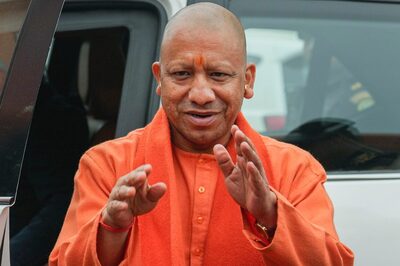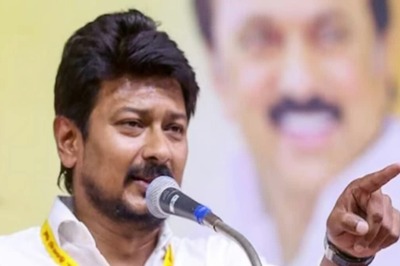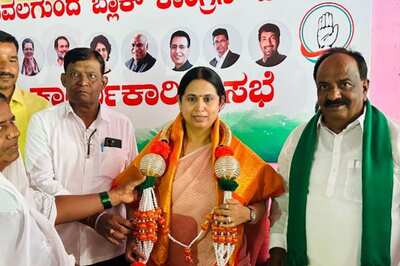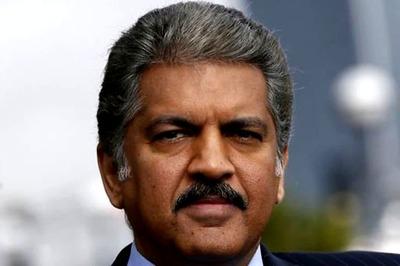
views
The Kerala government will implement the K-rail or SilverLine project, as it concerned the future of the state’s children, Chief Minister Pinarayi Vijayan said on Tuesady, as politics and protests heat up over the LDF government’s dream undertaking.
On Monday, residents had prevented revenue officials from laying survey stones for the SilverLine project in Kuriyalippady within municipal limits, according to reports. Following public outrage, officials were forced to stop affixing stones.
A tense situation prevailed in the area after the truck transporting survey stones remained parked at a location until evening, the Times of India said in a report. Residents and protesters were also present as police and revenue officials remained at the same location until evening.
By 10.30 AM, a revenue department team led by the special tahsildar had arrived on the scene, as residents who had gathered since 9 AM had blocked the truck’s path. The protest was led by MLA Thiruvanchoor Radhakrishnan, DCC president Nattakom Suresh, Kerala Congress district president Saji Manjakadambil, and ward councillor Vinu Mohan. Despite the presence of a police team led by Kottayam DSP Santhosh Kumar at the scene, no action was taken. The truck left around 5.30 PM, and the protesters followed suit.
The state-wide protest against SilverLine, the LDF government’s dream project, has been stepped up by the Congress and its affiliated organisations, as well as the BJP.
CPM state secretary Kodiyeri Balakrishnan however, has reaffirmed the party’s commitment to the K-Rail project. He stated that those who oppose the project will not be able to stop it by removing the survey stones.
K-Rail managing director V Ajith Kumar has said that the stones are being laid in connection with the SilverLine project’s social impact study, and not to acquire the land. He stated that the company will conduct the survey.
According to Kumar, the K-Rail corporation will proceed with land acquisition only after receiving final approval from the railways, and the alignment will be changed if necessary. He stated that the project will only be carried out by paying the compensation required by law, and that no one should be concerned that the land will be acquired without paying the compensation.
Meanwhile, Congress-led UDF (United Democratic Front) in Kerala on Monday intensified its agitation against the LDF (Left Democratic Front) government’s SilverLine project and said it was not impressed or scared by the threats of the ruling front to imprison those who remove the survey stones, even as the CPI(M) maintained that no agitation would lead to abandoning of the semi-high speed rail corridor.
Leader of Opposition in the State Assembly V D Satheesan said the UDF was planning to hold 100 public meetings in the State to show people the project was not worth it and the first meeting would be held at Mulakuzha in Chengannur. Satheesan, in a statement, said the UDF was not scared or impressed by Chief Minister Pinarayi Vijayan’s threats to imprison anyone who removes the survey stones laid in connection with the project and that they would go and remove the stones and go to jail. CPI(M) State general secretary Kodiyeri Balakrishnan hit back at the Congress by saying if it wants stones, the government can supply them and described the agitation as a joke. He said the UDF did not implement the project and now it was not allowing anyone else to carry it out.
Silverline or K-Rail Project
The SilverLine project, expected to reduce travel time from Thiruvananthapuram to Kasaragod to around four hours, is being opposed by the UDF, which has been alleging that it was unscientific and impractical besides putting a huge financial burden on the State. The LDF government contended that the UDF was anti-development.
The government said the project would be beneficial for future generations, would result in economic development, reduce carbon emissions every year by around 2.8 lakh tonnes. Therefore, LDF said, everyone should come together to make the rail corridor a reality. In many places across the State, people have been opposing laying of the survey stones identifying properties for the project and for carrying out a social impact assessment.
The 530-km stretch from Thiruvananthapuram to Kasaragod would be developed by K-Rail — a joint venture of the Kerala government and the Railway Ministry. Starting from the State capital, SilverLine trains would have stoppages at Kollam, Chengannur, Kottayam, Ernakulam, Thrissur, Tirur, Kozhikode and Kannur before reaching Kasaragod.
Environmental, Other Concerns
Amid environmental concerns being raised ahead of the project, renowned Indian ecologist Professor Madhav Gadgil has said that the SilverLine project will affect the environment evidently and indirectly.
“Poor people will have to suffer the consequences of all this. The voices of protest raised by people will not be in vain, he said while attending a program online at Maharaja’s College in Ernakulam, Mathrubhumi English reported.
Dr V S Vijayan, former chairperson of the Kerala State Biodiversity Board, stated that the project will result in a loss of Rs 28 lakh due to the impact on water bodies. When a hectare of a water body is destroyed, it is estimated that a loss of Rs 98 lakh will occur. He stated that he had sent a letter outlining the facts to the Chief Minister. So far, however, there has been no response from the government.
‘Metroman’ E. Sreedharan who has been nominated to head the series of protests that have been planned by the BJP, had earlier said that this project, if implemented, will become an environmental disaster for Kerala.
Sreedharan went on to pick holes in the detailed project report of the K-Rail, saying that all along the sides of the proposed track, an eight-feet-high wall, which will cost Rs 8 crore for one kilometre, has to be constructed, and there has to be a mesh on its top, but this not mentioned in the DPR.
He further pointed out that there is no mention of the flyovers and subways in the DPR.
‘Will Take Mind-Boggling Time to Complete’
Noted economist K.P. Kannan while taking part in a discussion on the controversial K-Rail – Silverline, had earlier come out with mind boggling figures. He said “if there is going to be a time and cost overrun” and “if the time taken to build Kochi Metro is an indicator, it will take a staggering 127 years to finish K-Rail project”.
However, if the time taken to build Delhi Metro is taken as indicator, then it would take 37 years to finish the project, Kannan asserted.
If completed, the pet project of Vijayan will see a 529.45 km corridor connecting Thiruvananthapuram to Kasaragod and a high speed train will run this distance in around four hours and it will cost Rs 63,940 crore. NITI Aayog says it might cost Rs 1.24 lakh crore and is expected to be completed in 2025, according to the detailed project report.
“If we look into the time taken by (Metroman) E. Sreedharan for Kochi Metro and if that’s going to be applied standards, it took him (DMRC) 6 years to build 25 km and on an average every year 4.17 km was built and if that’s the average efficiency then for the K-Rail it will take 127 years. If we take Delhi Metro for the time taken as the standard, then K-Rail will take 37 years,” said Kannan.
Techno-Economic Feasibility a Concern
Concerns about the environmental impact of Kerala’s controversial semi-high speed SilverLine rail project are “real,” so the project’s final approval will “depend on the detailed techno-economic feasibility,” said Railway Minister Ashwini Vaishnaw had earlier said in the Lok Sabha.
“The concerns about environmental issues are real concerns. They are genuine concerns. If it is implemented in the way the project is currently designed, we do not really understand what will be the environmental impact on the State. That is the reality,” Vaishnaw had said.
In response to Ernakulam MP Hibi Eden’s question about the project’s approval uncertainty, the minister stated, “As far as Indian Railways is concerned, we have very clearly stated that the project’s final sanction will depend on the detailed techno-economic feasibility. We must determine whether the technology is suitable and whether the soil conditions are suitable.”
“This is a 530-kilometre project which has about 88 kilometres viaduct and 36 kilometres tunnel. It is a standard gauge line. So, there is no interoperability. That means, a train, which goes on the normal Indian railway network, cannot really use this line,” the minister had said, according to reports.
“On financial feasibility, the cost which is estimated is definitely an underestimate. So, we need to carefully look into all these things, then only something can come out… I would like that this should be handled in a very systematic manner,” he had added.
With inputs from PTI, IANS
Read all the Latest News India and Breaking News here




















Comments
0 comment